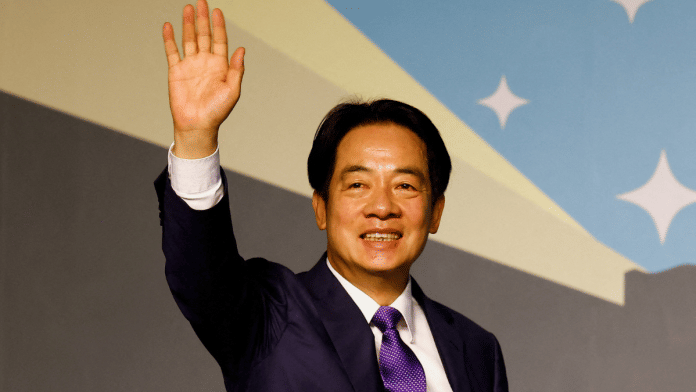TAIPEI (Reuters): Taiwan President Lai Ching-te asked China on Monday to stop its military and political threats, saying in his inauguration speech that peace is the only choice and that Beijing had to respect the choice of the Taiwanese people.
Lai, addressing the crowd outside the Japanese-colonial-era presidential office in central Taipei, repeated a call for talks with China, which views the proudly democratic island as its own territory and has never renounced the use of force to bring it under Beijing’s control.
“I also want to urge China to stop intimidating Taiwan politically and militarily, and to take on the global responsibility with Taiwan to work hard on maintaining peace and stability across the Taiwan Strait and in the region, to ensure the world is without the fear of war breaking out,” he said. “We also want to declare this to the world: Taiwan makes no concessions on democracy and freedom. Peace is the only option and prosperity is our goal for long-term peace and stability.”
China’s foreign ministry, asked about the inauguration, said that Taiwan independence is a “dead end”, and that no matter under what banner, secession is doomed to fail.
China repeatedly called Lai a “separatist” who risked war in the run-up to his election in January.
Taiwan has faced pressure from China, including regular air force and navy activities near the island, since the election victory by Lai, 64, who is widely known by his English name, William.
Lai, who took over from Tsai Ing-wen having served as her vice president for the past four years, said people must be realistic about the threat and Taiwan must show its determination to defend itself.
“Fellow citizens, we have the ideal to pursue peace, but we must not have illusions,” he said. “Before China gives up using force to invade Taiwan, citizens must understand this: Even if we accept all of China’s claims and give up our sovereignty, China’s ambition to annex Taiwan will not disappear.”
Lai received loud applause after reiterating that the Republic of China – Taiwan’s formal name – and the People’s Republic of China are “not subordinate to each other”, a line Tsai also took.
Taiwan’s defence ministry, in its daily report on Monday about Chinese military activities in the previous 24 hours, said six Chinese aircraft had crossed the Taiwan Strait’s median line, which previously served as an unofficial boundary but that China says it does not recognise.
At least one of the aircraft got within 43 nautical miles (80 km) of the northern Taiwanese port city of Keelung, according to a map provided by the ministry. Such incursions have become relatively common in recent years.
In attendance at the ceremony are former U.S. officials dispatched by President Joe Biden, lawmakers from countries including Japan, Germany and Canada, and leaders from some of the 12 countries that still maintain formal diplomatic ties with Taiwan, such as Paraguay President Santiago Pena.
U.S. Secretary of State Antony Blinken congratulated Lai, saying the United States looked forward to working with him “to advance our shared interests and values, deepen our longstanding unofficial relationship, and maintain peace and stability across the Taiwan Strait”.
Fighter jets and sing-alongs
Taiwanese fighter jets flew in formation over Taipei after Lai’s speech.
At the end of the ceremony, Lai and Vice President Hsiao Bi-khim, formerly Taiwan’s de facto ambassador to the United States, led the crowd in a sing-along to pop songs as they danced onstage with the other performers.
Lai wore a purple tie, representing a butterfly native to Taiwan, and a yellow pin on his lapel of mustard flowers, a common plant in fields across the island.
He received seals symbolising his presidential power from the parliament speaker, including the seal of Republic of China and the seal of honour, both brought to Taiwan after the Republican government fled to Taiwan in 1949 after losing the Chinese civil war to Mao Zedong’s Communists.
Late Sunday, widely read state-backed Chinese newspaper the Global Times said Lai could become “more and more provocative” once he takes office.
“So in the long term, the state of cross-straits relations will not be optimistic,” it said in an online commentary.
Lai’s domestic challenges loom large too, given his Democratic Progressive Party (DPP) lost its parliamentary majority in the January election.
On Friday, lawmakers punched, shoved and screamed at each other in a bitter dispute over parliamentary reforms the opposition is pushing. There could be more fighting on Tuesday when lawmakers esume their discussions.
(Reporting by Yimou Lee and Ben Blanchard; Additional reporting by Eduardo Baptista in Beijing;Editing by Lincoln Feast, Peter Graff and Gerry Doyle)
Disclaimer: This report is auto generated from the Reuters news service. ThePrint holds no responsibility for its content.






